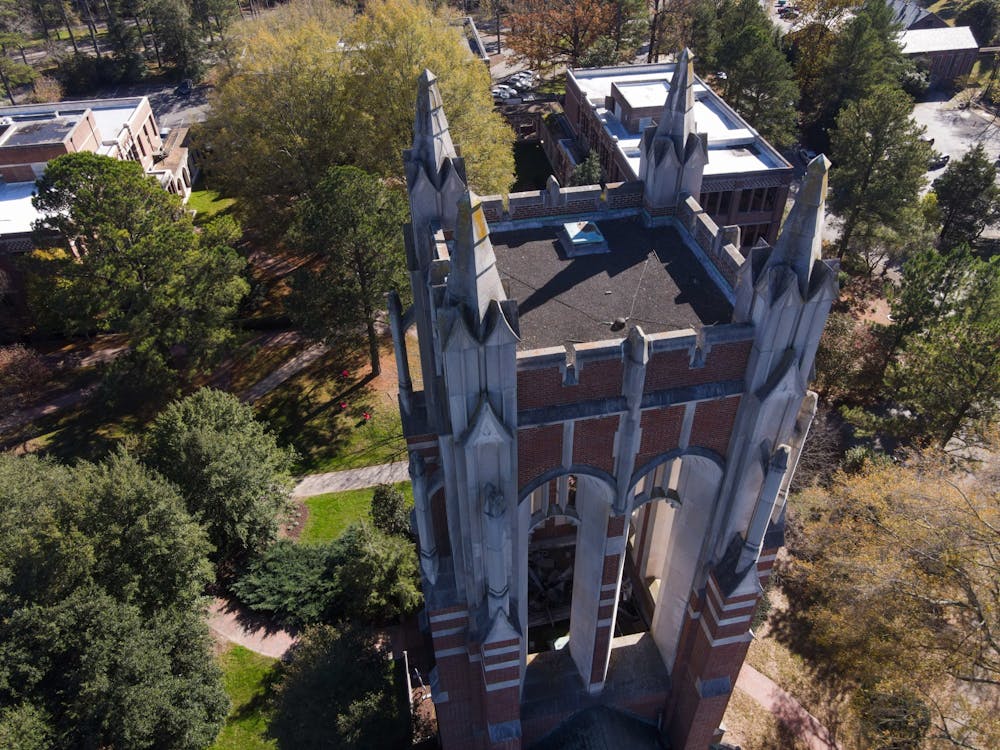The Community Dialogue Facilitation Network, which aims to strengthen skills needed to facilitate difficult dialogue, started with a pilot series of five sessions this month.
The pilot series is led by Glyn Hughes, University of Richmond professor of sociology and anthropology and former director of Common Ground, and Amy Howard, senior administrative officer for equity and community. Deans, administrators and select faculty and students were invited to attend the CDFN pilot sessions.
The CDFN pilot was inspired by the University of Michigan's National Intergroup Dialogue Institute, which four UR faculty members, including Hughes, attended last June via Zoom, Hughes said.
The faculty were encouraged to attend the three-day event by UR president Ronald Crutcher after the racist incidents and subsequent forums on campus last spring, Hughes said.
Hughes, Howard and Theran Fisher, director of talent and organizational effectiveness in UR's human resources department, chose who was invited to attend the sessions, Hughes said. They based their decisions on whose opinions and experiences they wanted to be included, Hughes said.
"We've invited folks who are already facilitators and leading groups on questions of equity and identity," Hughes said, "because we wanted to draw on that collective wisdom about how we should shape this initiative.
"So the pilot is not just novices. It's, in a way, a sampling of experts we already have on campus to go through a curriculum and get feedback."
Juniors Lauren Stenson and Emma Johnson, the founders of Interpoint, were the two students chosen to be involved in the CDFN pilot. Interpoint, which officially launched on campus in spring 2020, intends to promote education and change by encouraging conversation about racism among people from different backgrounds, according to its website.
"[Hughes and Howard] reached out to us to ask if we'd be willing to sit on the network because of our continued efforts in trying to get people trained," Stenson said. "Interpoint has a yearly budget, and the last few semesters, we've used our budget to help other organizations get professional facilitation training.
"We're trying to help develop another way of training facilitators that can happen long-term on campus."
Stenson is excited about what the CDFN can be, she said.
"In the last probably year or year and a half, there's been a big wave of students trying to have conversations about different issues, whether that be about global warming or racism or their student experiences," Stenson said. "The thing about doing that is it takes people to host those conversations.
Enjoy what you're reading?
Signup for our newsletter
"I hope that at this pilot, we have a coherent and clear form and method of training people, so they feel like they have the tools they need to host their own conversations on campus and after they graduate."
The first meeting, which was on March 5, focused on what the group's involvement on campus is going to be and how to use their position as facilitators to serve the UR community, Johnson said. Matthew Freeman and David Campt from Dialectix Consulting were brought in to help direct the conversation, Johnson said. Both of them have worked with Interpoint in the past and specialize in training facilitators, Johnson said.
Johnson pointed to the recent discussions around the naming of Mitchell-Freeman and Ryland halls.
"There's so many conversations this university needs to be having, and a lot of that is honestly just sitting in a room and committing to being uncomfortable," Johnson said. "It's not fun to work through issues, especially when everyone has their own story and worldview, and sometimes those intersect and sometimes they don't."
Johnson hopes that the network serves as a jumping-off point for increased training facilitation, she said.
"I hope that we can continue to expand that network of people who are going to question the structures, question the things we have in place and question how we can make them better," she said.
There will always be people who do not want to participate in conversations about equity and inclusion, Hughes acknowledged. But it is still important to nurture the people who do want to have those conversations because this creates a stronger set of community norms, Hughes said.
"When you do that, you indirectly make it more costly, in a social sense, for those who aren't leaning into that," Hughes said. "Those folks become the real outliers.
"Too often, the focus is on the people who 'don't get it,' and we end up not nurturing the community of folks who do want to lean in, who are hungry for skills."
Although the CDFN and having discussions are good starting points, taking action is still important, Johnson said.
"People need to be having these conversations, but at the end of the day, there has to be structural change," Johnson said. "I think conversation is only part of the cultural change that needs to happen on campus. I don't think it's the final destination."
Right now, the CDFN is more of a concept than a fully formed program, but the long-term goal is for the CDFN to host at least a few sessions each year, Hughes said.
Contact news writer Meredith Moran at meredith.moran@richmond.edu.
Support independent student media
You can make a tax-deductible donation by clicking the button below, which takes you to our secure PayPal account. The page is set up to receive contributions in whatever amount you designate. We look forward to using the money we raise to further our mission of providing honest and accurate information to students, faculty, staff, alumni and others in the general public.
Donate Now



